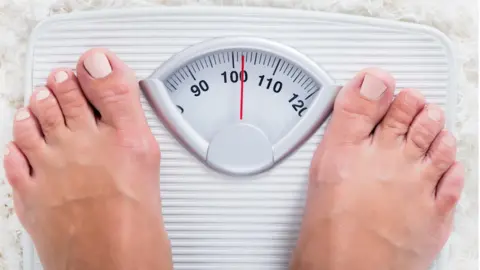Low-calorie shakes and soup diets 'recommended for obese'
 Getty Images
Getty ImagesDiet replacement programmes made up of low-calorie soups, shakes and regular counselling should be a recommended NHS treatment for obesity, a BMJ study says.
People on the diets lost three times more weight than those given standard dietary advice by their GP, University of Oxford researchers found.
And their risk of developing heart disease and type-2 diabetes reduced.
But experts said it would work only if eating habits were changed for good.
Prof Paul Aveyard, study author, GP and professor of behavioural medicine at the University of Oxford, said losing weight and keeping it off was hard.
"It's boring being on a normal diet and people struggle to stick to it for a year," he said.
"But these programmes get you when your mental strength is at its highest.
"You have to concentrate effort into 12 weeks and because they eat so little, they lose a lot of weight quickly."
Total diet replacement programmes are designed for people who are obese or seriously obese, with a body mass index (BMI) of more than 30, who have been unable to lose weight despite changes to diet and lifestyle.
They are currently only available privately - although NHS England has said it is considering the diets as part of a long-term plan for the NHS.
The programmes reduce daily calorie intake by replacing food with specially formulated drinks, soups and snacks. Milk, water and fibre supplements are also taken.
A typical daily intake might include:
- a chocolate-flavour skimmed milk and soya protein shake mix (145kcal)
- chicken-and-mushroom-flavour skimmed milk and soya protein soup mix (138kcal)
- skimmed milk and multi-wholegrain porridge mix (149kcal)
- lemon-flavour soya and milk protein bar covered in yoghurt-flavour coating (150kcal)
Stick to the diet
In this study, of 278 people from 10 GP practices in Oxfordshire, half followed the Cambridge Weight Plan programme for eight weeks - limiting intake to 810kcal per day - then re-introduced other food gradually over the next four weeks.
They also saw a trained counsellor every week, for 24 weeks in total, to help them stick to the diet and keep the weight off.
The other half of participants were given the usual weight management advice and support from their GP practice.
 Getty Images
Getty ImagesAt every stage of the study, people following the diet replacement programme lost more weight.
After a year, they had lost on average 1st 9lb (10.7kg) compared with half a stone (3.1kg) for those in the usual weight loss group.
When their blood pressure and cholesterol was measured, there were also noticeable improvements.
And those with type-2 diabetes were able to radically reduce their medication, although the study found no evidence of the condition being reversed.
'Potential to be scaled up'
One in four adults in the UK is obese and the number of people being diagnosed with type-2 diabetes is on the rise.
Last year, a trial of patients with type-2 diabetes given a low-calorie diet of shakes and soups found half were able to lose enough weight to reverse the condition.
It is often said that losing weight quickly on these types of programmes might lead to the weight piling back on again - but the researchers said the study showed this wasn't the case.
Prof Aveyard said the programme was an "effective intervention which GPs can confidently recommend, knowing that it leads to sustainable weight loss and lowers the risk of heart disease and diabetes".
Dr Barbara McGowan, a member of the Society for Endocrinology, consultant endocrinologist and lead for medical obesity services at Guy's and St Thomas' Hospital, said: "It has the potential to be scaled up across the NHS if found to be cost-effective as a treatment for obesity."
Dr Katarina Kos, a senior lecturer in diabetes and obesity at the University of Exeter Medical School, said people should not try one of these diets on their own, without any support.
"Of course losing weight is good if you are overweight but a large body of research indicates that the only way it will work is if using the programme as a means to future change, as a stepping stone to change eating habits for good," she said.
'Stay fit and healthy'
Prof Helen Stokes-Lampard, who chairs the Royal College of GPs, said she would like to see more research in this area.
"Of course, what works for one patient might not work for another," she said. "And GPs will always aim to take into account the physical, psychological and social factors potentially impacting on a patient's health when giving them advice."
Prof Helen Stokes-Lampard said weight loss programmes should not be seen as the only option for patients.
"Ultimately, the best way to stay fit and healthy is to keep active, eat a healthy and balanced diet, get enough sleep, drink moderately in accordance with guidelines, and not smoke," she said.
The trial was funded in part by Cambridge Weight Plan UK.

Your comments on total replacement diets:
 JANE MOORE
JANE MOORE'The weight creeps back on'
Jane Moore from Northampton used the weight loss programme trialled in the study.
"This has enraged me. The first time I used it I did indeed lose weight quickly, probably a stone in a few weeks, but as soon as you return to normal eating the weight creeps back on.
"This type of 'diet' does nothing to educate overweight people long term, and simply encourages unhealthy yo-yo dieting in my opinion.
"In addition I developed gallstones and was hospitalised with jaundice and pancreatitis as a result of them fragmenting.
"When I had my gallbladder removed, my consultant believed that yo-yo dieting contributed to me developing these problems.
"I am delighted to say that through healthy eating I have now lost three-and-a-half stone and have kept this off for over two years now."
 KAREN TAYLOR
KAREN TAYLOR'I have lost seven stones'
Karen Taylor, and her daughter Jess, from Aylesbury, used the same diet plan with impressive results.
"Jess has lost just over three stone and I have lost seven stone since January this year.
"I have suffered with my weight for many years and since childhood. I overate when pregnant with Jess, comfort ate when my marriage broke down and continued to sabotage myself with food for years, all the while thinking food was my friend.
"In January this year we embarked on our weight loss journey together and have never looked back since."
